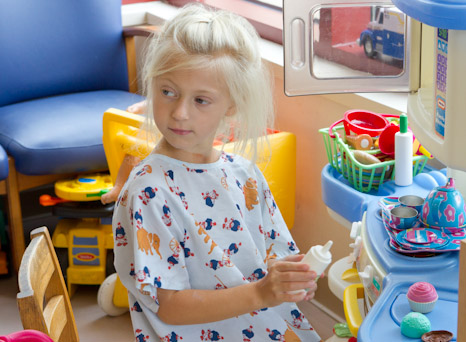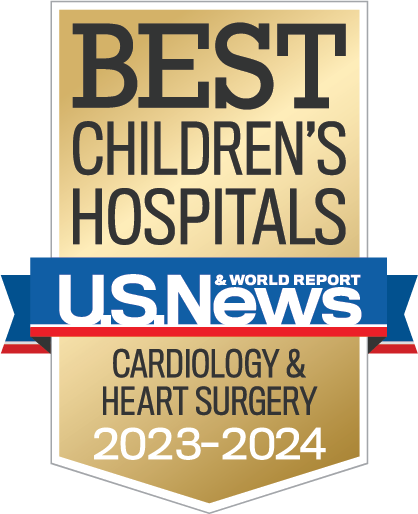 Each year, the Acute Cardiac Care Unit (ACCU) at Boston Children's Hospital provides around-the-clock care and monitoring to thousands of children — and adults — with acquired or congenital heart defects, from simple to complex cases.
Each year, the Acute Cardiac Care Unit (ACCU) at Boston Children's Hospital provides around-the-clock care and monitoring to thousands of children — and adults — with acquired or congenital heart defects, from simple to complex cases.
Staffed by highly trained cardiologists, cardiac nurses, Child Life specialists, and dietitians, our goal is simple: to make sure your child is comfortable and getting the best care possible. Our specialized training in pediatric cardiology means that we understand the unique challenges, circumstances, and intricacies of working with young people who have heart disease and other heart ailments.
Family centered care
From the moment your child is admitted to Boston Children’s, you are welcomed as a member of our care team. We will describe every aspect of your child’s care and keep you informed every step of the way. Because you know your child best, your input in encouraged. So don’t be afraid to ask questions or make suggestions.
The Acute Cardiac Care Unit is designed to make children feel more relaxed during a hospital stay. For young children, we have a playroom just down the hallway from the patient rooms, filled with toys, puzzles, and books. Older children can take advantage of our activity room, with books, video games, and computers.
Your visit
During your child’s hospital stay, you’ll work with a team of professionals who are committed to supporting all of your family’s physical and psychosocial needs. These frequently asked questions and answers may help you prepare for your child’s stay.
8 East is Boston Children’s Hospital’s inpatient Medical/Surgical Unit, located on the eighth floor of the main building at Boston Children’s. It consists of 42 beds.
When your child is admitted to the hospital or undergoes a procedure, it can be stressful for the whole family. At Boston Children’s, we’re dedicated to making your and your family’s hospital experience as positive as possible. Please let us know if there’s anything we can do to improve your stay. Here are tips to help you prepare.
8 East is for infants, children, teens, and, in some cases, adults with heart disease. Children admitted for elective cardiac catheterization and surgery are often admitted here as well.
Patient rooms have one or two beds, which are assigned according to our patients’ needs. There’s a shower and bathroom in each room, and a curtain around each bed that can be closed for privacy.
Yes, one parent can sleep at their child’s bedside. The chairs in the patient rooms are pull-out beds. You may help yourself to sheets and towels from the linen carts, which are located on the east and north side of the center. You can shower and use the bathroom in your child’s room. The curtain around your child’s bed can be closed for privacy, unless otherwise requested by your nurse. If other accommodations are needed, our resource specialist can help you.
Please lock up your personal belongings when you are not in your child’s room. There are small storage compartments located inside the wardrobe closet at each bedside. You may bring a lock (a small key or combination) from home. The lock must be removed when your child leaves the hospital.
Parents can be with their child 24 hours a day. You will be given an identification badge when your child is admitted.
Visitors outside the immediate family are welcome from noon to 8 p.m. Visitors should follow Boston Children’s visitor guidelines.
Call the nurses’ station at 617-355-8083. To contact the nurse while in your child’s room on 8 East, use the white call box in each patient room. In a non-emergency situation, you can speak to the nurse over the intercom by pushing the button labeled "nurse." The white call box also operates the television. In an emergency, you can push the large red button located on the wall by the head of the bed.
To call out of patient rooms, dial 9-1-number. Local and long-distance calls must be dialed collect or charged to a calling card. Pay phones are located near the elevators and in the main lobby.
You can receive phone calls directly into the patient room. The telephone number is located on the phone. Cell phones cannot be used in the patient rooms. Parents must go to the area by the elevators to use cell phones.
We respect the confidentiality of you and your child. For this reason, we only provide information to you and your child’s primary care physician.
Most children are weighed daily before breakfast and given medications between 8 and 10 a.m. Vital signs, including temperature, heart rate, respiratory rate, and blood pressure, are taken at this time too. Your child may be scheduled for other routine tests throughout the day as well. Naptime or rest period is usually between 1 and 3 p.m.
The nurse needs to know how much your child eats and drinks, as well as how much he eliminates in urine or stool. If you give your child something to drink, please save the container, and please save all diapers for your nurse.
Amenities on 8 East
We understand that a hospital stay can be difficult and overwhelming. We hope these amenities will make your stay more comfortable and enable you to focus on the health of your child.
- Treatment rooms: We’ve set up treatment rooms that are designated for blood drawing and other procedures. This allows your child’s room to remain a “safe place” where she can relax.
- Televisions: There are TVs and VCRs in every patient room that can be tuned to both television and radio stations. The television system carries local stations and some satellite stations 24 hours a day. Movies are shown from 9 a.m. to 11 p.m., seven days a week.
- “Children's Midday” is offered each Tuesday at 2 p.m. on Channel 22. This live, interactive show, produced in the Patient Entertainment Center, welcomes patient participation from viewers on inpatient units as well as those in the entertainment area.
- Movies and Nintendo are available upon request to use in patient rooms. We encourage children to bring PlayStation cartridges or movies from home.
- Internet: Wireless internet access is available in the patient rooms. Computers are not provided, but you and your child can bring a laptop. Computers are also available for you to use in the Hale Family Center for Families.
- Meals: Meals can be ordered for patients anytime from 7 a.m. to 6:45 p.m. Orders can be placed by calling F-O-O-D (ext. 5-3663) from the phone in the room or 617-355-FOOD when calling from outside the hospital. Please call 45 minutes prior to mealtime. Meals can be ordered up to 24 hours in advance. Menus are available when your child is admitted to the center.
- Snacks: There is food in the Patient Nourishment Center if your child needs a snack. There’s also a parents’ refrigerator in each kitchen for your use. Please label your food with your name and the date clearly visible, to prevent food from being thrown out when the refrigerator is cleaned.
- Playroom and activity room: Both the playroom and the activity room are open during the day for relaxing or taking a break from the hospital routine. The playroom is designed for infants, toddlers, preschoolers, and school-age children, and offers age-appropriate toys and games. The activity room is shared by teens, young adults, and parents. It has board games, books, video games (including Wii), and computers. Because the playroom and activity room are places where children can relax and temporarily escape the stress of the hospital, all medical examinations or procedures that may upset your child are prohibited in these areas.
- Bedside activities: Activities are provided in your child’s room if she can’t go to the playroom.
- Child Life specialist: A Child Life specialist works Monday through Friday and usually coordinates one scheduled group activity each day.
- Tutoring: Tutoring is available for children who will be absent from school for at least two weeks (at home or in the hospital) due to illness. Your child should bring his or her schoolwork to the hospital, if possible. An assigned tutor will contact your child's school and develop a plan to cover any missed lessons. Please talk with your nurse or Child Life specialist for more information.

